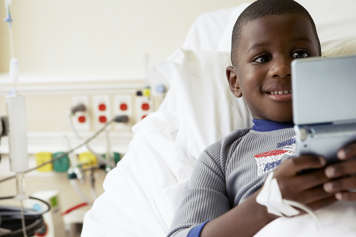Play is about much more than fun
Being at the hospital is disruptive to a child's routine. Play is one way to reconnect a child to their home life. The more a child can play, the happier the child will be. Happiness promotes recovery.
Play is about much more than fun
Being at the hospital is disruptive to a child's routine. Play is one way to reconnect a child to their home life. The more a child can play, the happier the child will be. Happiness promotes recovery.
Play has other benefits
Play can distract a child from pain and worry. Play can also help a child get used to the new people and things they will see at the hospital.
Many hospitals have child life specialists who run play programs and play with kids. Ask your child's nurse about this. Through play, a child life specialist can help a child learn about their condition and the steps the health-care team is taking to help them.
Play is also important because it can help a child regain confidence and build self-esteem.
Suggested toys for children aged 6 to 8 years
Younger school-age children may enjoy the following toys and games:
- books
- puzzles: 20 to 75 pieces
- dolls and doll houses
- construction toys, cars and trucks
- Lego
- pencil and paper games such as Tic-Tac-Toe
- board and card games
- electronic games (ask your child's nurse about this)
- space toys
- arts and crafts such as paper, paints, crayons, markers, glue, scissors, clay and Play-Doh
- dramatic play
- school play
- grooming items
- collecting items such as stickers, stamp, and baseball cards
Suggested toys for children aged 9 to 11 years
Older school-age children may enjoy the following toys and games:
- word games
- board games
- books and magazines
- models
- electronic games (ask your child's nurse about this)
- computers
- puzzles: 75 to 275 pieces
- building sets such as Lego
- recorded music
- more challenging arts and crafts
- paper, pens, markers
- journals
- collecting items
